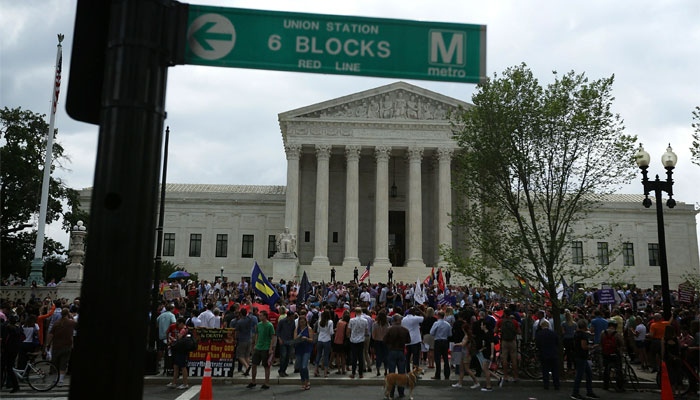A crowd gathers after the U.S Supreme Court handed down a ruling regarding same-sex marriage June 26, 2015 outside the Supreme Court in Washington, DC. AFP
AFP/ Washington
The US Supreme Court made same-sex marriage legal throughout the nation Friday in a much-awaited landmark decision that triggered wild scenes of jubilation and tears of joy.
In a 5-4 ruling, the highest court in the United States said the Constitution requires all 50 states to carry out and recognize marriage between people of the same sex.
President Barack Obama, in heartfelt remarks, praised the ruling as "a victory for America," in a fresh coup for the White House a day after the Supreme Court upheld a disputed section of his signature health care reform.
"Today we can say in no uncertain terms that we've made our union a little more perfect," he said at the White House, which changed its Twitter avatar to the rainbow colors of the growing gay rights movement.
"This decision affirms what millions of Americans already believe in their hearts -- when all Americans are treated as equal, we are all more free."
Flag-waving LGBT rights advocates on the packed Supreme Court forecourt -- some in tears -- cheered, danced and sang "The Star-Spangled Banner" in celebration.
Prominent in the crowd was Jim Obergefell, the lead plaintiff in the case, clutching a photo of his deceased husband John.
A clearly affected Obergefell took a brief phone call from Obama, who told him: "Not only have you been a great example for people but you're also going to bring about a lasting change in this country.
"And it's pretty rare where that happens so I couldn't be prouder of you and your husband. God bless you."
Obergefell, who was live on television at the time, replied humbly: "Thank you, sir. That means an incredible amount to me."
Dissenting voices
Also in the vast crowd outside court as the life-changing news filtered through was Robert Westover, 52, and Tom Fulton, 57, who hugged and kissed.
"It feels like my birthday, the prom, our wedding day. It's hard to express the intensity of this moment, that our love now is equal," Westover told AFP.
The case was brought by 14 same-sex couples, and the widowers of two gay couples, including Obergefell, who had challenged de facto bans on same-sex marriage in Michigan, Kentucky, Ohio and Tennessee.
All four states had insisted in their respective constitutions that marriage could only be a union between a man and a woman.
"The Fourteenth Amendment requires a state to license a marriage between two people of the same sex and to recognize a marriage between two people of the same sex when their marriage was lawfully licensed and performed out-of-State," the court said.
Marriage, it added, has been a core institution in society since ancient times, "but it has not stood in isolation from developments in law and society."
To exclude them from marriage, it said, would deny same-sex couples "the constellation of benefits that the states have linked to marriage."
Voicing dissent was Chief Justice John Roberts, who expressed concern that the court was making a decision better left to elected state legislatures.
"If you are among the many Americans -- of whatever sexual orientation -- who favor expanding same-sex marriage, by all means celebrate today's decision," he said.
"Celebrate the achievement of a desired goal. Celebrate the opportunity for a new expression of commitment to a partner. Celebrate the availability of new benefits.
"But do not celebrate the Constitution. It had nothing to do with it."

